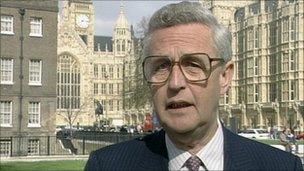John Cole: Me and Mrs Thatcher
- Published

John Cole was BBC political editor during the Thatcher years
Margaret Thatcher was a disciplined politician. After all, she was the first woman to become leader of a British political party, which at the time, in the mid-1970s, was a revolutionary development.
I am convinced that her gender and the fight a woman faced to get to the very top made her the kind of determined, obstinate politician she became.
Her enamelled certitude often did not make her easy to interview.
Yet after the Brighton bomb, when she had been through an experience which would have taxed anyone's nerves, she ignored the hustling of her bodyguards and waited till she was sure I had recorded everything I wanted from her.
That was Margaret Thatcher at her courageous best.
Headmistress Thatcher
During the 1983 general election, the BBC had asked me to conduct weekly interviews for news bulletins of the three party leaders: Mrs Thatcher, Michael Foot of Labour and Roy Jenkins, representing the Liberal-SDP Alliance.
It quickly became clear to me that these interviews were unlikely to produce anything I could present as "news", since the party leaders, quite understandably, recited the key passages from the previous evening's speeches.
I was near despair when, one week, stuck in a traffic jam on the way to meet the prime minister, I read in a paper that an (un-named) Conservative MP had said: "Margaret's like a headmistress - she bosses us all about."
At an arid moment in the interview, I sprang this opinion on her.
The pale blue eyes beamed in on me: "Well, what's wrong with that? I had two headmistresses, women who knew what they believed and acted on what they knew, and the girls under their leadership all benefited from that."
I had just enough sense not to interrupt but to let it all flow into the sound-recordist's box.
Then I thanked her and ended the interview.
For such a self-possessed woman, she became unduly anxious.
"Was that all right?" she asked.
"Oh, yes," I replied, for at last I had got something from her that revealed her self-image.
Only when Gordon Reece, her press guru, arrived in the studio, rubbing his hands together in satisfaction, did she relax.
'On and on'
The only other occasion when I tricked her into saying something unexpected was when she gave news interviews on the day she announced the 1987 general election.
I knew that her deputy, Willie Whitelaw, and Lord Carrington had been telling her that, having been 10 years at the top of the Conservatives, she would be wise to retire at a time of her own choosing.
So I inquired, kindly, whether this would be her last election.
"Oh, no," she replied firmly, "I'm going on and on."
It was news not only to my listeners and viewers but to any number of ambitious Tories who had their eyes on the succession.
Poll tax
Most political leaders stay on too long.
When Margaret Thatcher ran into disputes which forced the resignations of her foreign secretary, Geoffrey Howe, and her chancellor, Nigel Lawson, and opened up a party rift over Europe, her leadership was fatally damaged.
She added to that an unpopular poll tax, which she clung to obstinately when her MPs knew it was putting their seats in peril.
Each Monday, I used to stand in the Members' Lobby as they returned from their constituencies.
I only needed to say "Well?" and they knew what I meant.
A shake of the head, and a murmur that the poll tax was "disastrous in my patch". The braver added: "We're going to have to do something about her."
Her supporters knew, as Margaret Thatcher had herself warned, that "the lady's not for turning".
Exciting period
The poll tax would last as long as her premiership.
So it was no surprise to me when, after Howe's damaging resignation speech, Michael Heseltine challenged her for the leadership.
And when she failed to get enough votes in the first ballot to defeat him, I knew that the end of her reign was near.
The next morning, I had not got my coat hung up before Conservative MPs were all but queuing up to tell me she was finished.
It was when cabinet ministers began to say that she could not go on that I became confident enough of the trend to predict the end of what had been an exciting period in British politics.